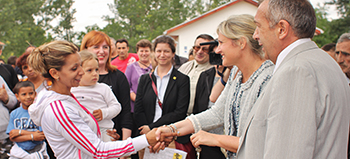Durable housing integration solutions
In Mala Krsna, near Smederevo, the 23 keys to the prefabricated houses were handed in to the refugees, IDPs and socially vulnerable who have spent over a decade in collective centers. The keys handed in representative of the Delegation of the EU to the Republic of Serbia, Commissariat for refugees and migrations of the RS, UNHCR, the City of Smederevo and Help.
In Mala Krsna, near Smederevo, the 23 keys to the prefabricated houses were handed in to the refugees, IDPs and socially vulnerable who have spent over a decade in collective centers. The keys handed in representative of the Delegation of the EU to the Republic of Serbia, Commissariat for refugees and migrations of the RS, UNHCR, the City of Smederevo and Help.
Within the project “Supporting access to rights, employment and livelihood enhancement of refugees and IDPs in Serbia”, financed by the EU, implemented by the organization Help in cooperation with the City of Smederevo, Commissariat for refugees and migrations, UNHCR, enabled durable housing solution for 42 families in Smederevo. Out of that number, 34 families are refugees’ and IDP’ families from collective centre and 8 families are the local socially vulnerable.
“This is another step forward in resolving issues on the joint agenda which is housing and employment of refugees, internally displaced persons and socially vulnerable population”, was a joint stance of Ms. Marzia Palotta from the Delegation of the EU to the Republic of Serbia, Mr. Ivan Gerginov from the Commissariat for refugees and migrations of the Republic of Serbia and Ms. Anna Molnar from the organization Help.
Construction works and delivered equipment in Smederevo is worth over 760.000 EUR, having the City provided for infrastructure for the 23 construction sites and co-financed the project with 84.000 EUR.
Through this European Union’ donation of nearly million Euros there was in total built 49 prefabricated houses in Smederevo and Kraljevo. This project has enabled durable housing solution to the most vulnerable families of refugees and internally displaced persons previously residing in collective centres as well as their final integration in the host communities. In addition another 9 families of socially vulnerable domicile population have been significantly improved.

